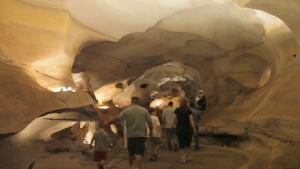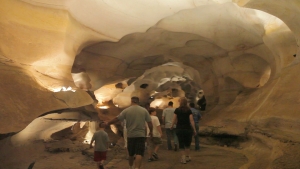
“Luxury” is not a word often associated with accommodations at state parks. However, a public-private partnership (P3/PPP) in West Virginia is out to change that notion.
In Lewis County, the Stonewall Resort State Park is celebrating the opening of 20 luxury cottages in a new development on the lakeshore. Private-sector capital and collaboration between public officials and private partners made the project possible.

Photo of Longhorn Cavern State Park courtesy of Texas Parks and Wildlife Department
“Cottage” at this state park is not a small, bare, screened-in structure where visitors will bring sleeping bags, propane stoves or lanterns. The cottages are two-story, four-bedroom accommodations with all types of amenities – Wi-Fi, central heat and air, washers, dryers and upscale kitchens.
The 20 cottages are part of a new development and will enhance a similar existing 10-unit cottage development which was begun in 2002. The initial cottages, with high occupancy rates, have enjoyed such success that this second development is now opening on the opposite shore of the park’s lake.
Because of collaboration and visionary people, Stonewall Jackson Lake State Park, which originally included the lake, a marina, campgrounds and a multipurpose building, has been reinvigorated. The park resulted from the U.S. Army Corps of Engineers’ completion of the Stonewall Jackson Dam. A beautiful 2,650-foot lake at the center of the park was formed when the dam was built.
With the state in debt to the Corps of Engineers for $35 million for building the dam and acquiring property for the lake, state officials sought a private-sector firm to secure commitments of $42 million for the project. The state contributed another $23 million and a development pool was created. Projects resulting from that development fund include an Arnold Palmer signature golf club, a beautiful 200-room lodge and the 10 original cottages. All are managed under a public-private partnership involving the state and a private concessionaire.
The Stonewall project is both innovative and unique and an example of how government can monetize assets through innovation and collaboration.
The Texas Parks and Wildlife Department (TPWD) also incentivizes collaborative efforts and encourages partnerships. Private firms offer services, programs and facilities. The state also has a lakefront resort development, a park-centered golf course and many marinas – all of which have resulted from partnerships with private firms. In fact, TPWD will soon issue a request for proposals from private-sector partners interested in operating the Longhorn Cavern State Park.
The newly minted P3/PPP law in Kentucky could have a positive impact on the state’s 17 resort parks. The state’s Secretary of Tourism, Parks and Heritage would like to see private firms operate and maintain the parks with the state retaining ownership and title to the property.
The state believes that visionary and creative initiatives with private-sector firms would create jobs, enhance the local and state economies and increase tax revenues. Parks officials say that passage of the bill means that contracts with private firms could be issued by the end of this year.
Partnerships such as these are never designed to replace a state’s investment in its parks. Rather, the objective is to increase and create new revenue while enhancing assets and offering more to citizens. Similar opportunities for collaborative initiatives such as these exist throughout the country.
SPI’s government procurement experts can help grow your business. Contact them today.
